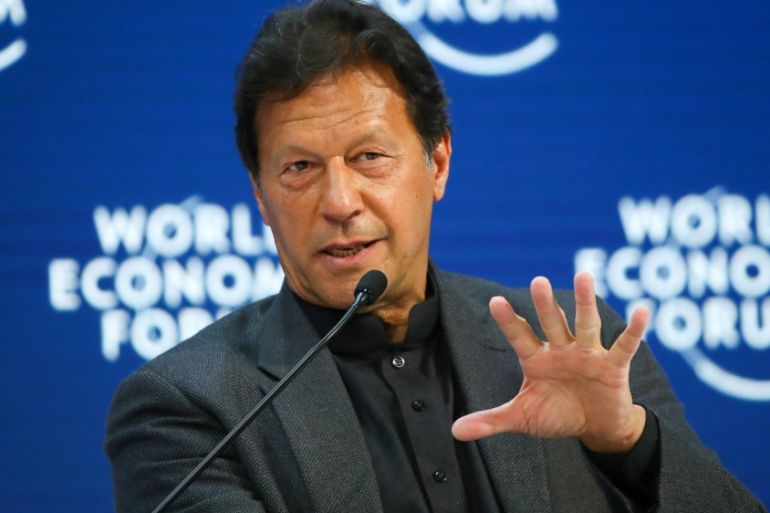Pakistani PM Imran Khan calls for UN action on India dispute
Khan urges the UN to help mediate between nuclear-armed India and Pakistan over the disputed territory of Kashmir.

Pakistan’s Prime Minister Imran Khan has called for the United Nations to help mediate between nuclear-armed India and Pakistan over the disputed territory of Kashmir.
“This is a potential flashpoint,” Khan said on Wednesday during a media briefing at the annual meeting of the World Economic Forum in Davos, Switzerland, adding that it was time for the “international institutions … specifically set up to stop this” to “come into action”.
Keep reading
list of 3 itemsImran Khan on ‘genocide’ in Kashmir and possible war with India
US president offers to ‘help’ India, Pakistan on Kashmir dispute
The Indian government in August revoked the constitutional autonomy of Indian-administered Kashmir, splitting the Muslim-majority region into two federal territories in a bid to integrate it fully with the rest of the country.
Kashmir is claimed in full by both India and Pakistan. The two countries have gone to war twice over it, and both rule parts of it. India’s portion has been plagued by separatist violence since the late 1980s.
This is not the first time Khan has sought international intervention.
“This is just a reiteration of his old position. He had said this in his earlier meeting with President Trump on the sidelines of the UN General Assembly [in September] as well,” Zahid Hussain, an Islamabad-based security analyst and journalist, said.
“It seems that since all the doors to talks with India are closed, that is one of the reasons why Pakistan is appealing to the international community to intervene,” he told Al Jazeera.
‘Ruling out an all-out war’
Khan said his biggest fear was how New Delhi would respond to the continuing protests in India over a citizenship law that many feel targets Muslims.
“We’re not close to a conflict right now … What if the protests get worse in India, and to distract attention from that, what if …”
Although, he said, the two nuclear-armed neighbours were not close to an all-out war, the international community, including the UN, “must act” to avert tensions between the two sides from hitting “a point of no return”.
Hussain said Pakistan is desperate to draw the attention of the international community to the problem.
“What he [Khan] is saying, one can only interpret it, probably he is referring to the situation in Kashmir, where there is a likelihood of things getting out of control once the lockdown is lifted,” he said.
“In this kind of situation, there is always a danger of things spilling over and sucking Pakistan into the conflict that could lead to a wider conflagration.”
The prime minister said he had discussed the prospect of war between his country and India a day earlier in a meeting with US President Donald Trump, who said he had offered to help mediate between the two countries.
But New Delhi has rejected any foreign mediation on the issue that brought the neighbours on the brink of war last February.
“The Indian position is much more hardened now. It is against any foreign involvement, and now is not interested in talking to Pakistan bilaterally as well,” Hussain, the security analyst, said.
Khan on Taliban-US talks
Khan said Pakistan and the United States were closer in their approach to the Taliban armed rebellion in Afghanistan than they had been for many years. He said he had never seen a military solution to that conflict.
“Finally the position of the US is there should be negotiations and a peace plan.”
In a separate on-stage conversation later on Wednesday, Khan said he had told Trump in their meeting that a war with Iran would be “a disaster for the world”. Trump did not respond, Khan said.
Khan made some of his most straightforward comments when asked why Pakistan has been muted in defence of Uighurs in China.
China has been widely condemned for setting up complexes in remote Xinjiang province that Beijing describes as “vocational training centres” to stamp out “extremism“ and give people new skills.
The UN says at least one million ethnic Uighurs and other Muslims have been detained.
When pressed on China’s policies, Khan said Pakistan’s relations with Beijing were too important for him to speak out publicly.
“China has helped us when we were at rock bottom. We are really grateful to the Chinese government, so we have decided that any issues we have had with China we will handle privately.”
Asad Hashim contributed to this report from Islamabad